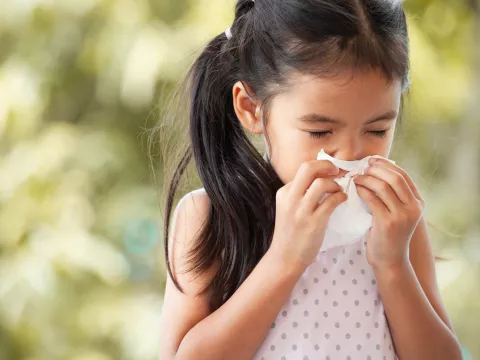- AdventHealth

Sniffling, sneezing, watery eyes and coughing: We’ve all been there. What starts as a tickle in the throat or a sneeze here or there can quickly turn into symptoms that last for days — sometimes weeks. But as common as these symptoms are, it can be hard to tell what exactly is causing your congestion.
You might find yourself asking a very common question: Is it a cold or allergies? Getting to the bottom of what’s causing your discomfort can put you on the path to wellness. Learn more about the differences between the common cold and seasonal allergies.
Signs and Symptoms of a Cold
There’s a reason it’s called the “common cold.” More than 3 million people catch a cold every year in the United States; adults are likely to have a cold two to three times every year.
A cold is caused by a virus. When someone with a cold sneezes or coughs, tiny virus droplets are spread into the air and land on surfaces. You can “pick up” the cold germs when you touch an infected area and then touch your face, eyes or mouth.
Telltale signs of a cold include:
- Body ache
- Congestion
- Coughing
- Fever
- Headache
- Sneezing
- Sore throat
Colds only last about seven to 10 days and can’t be treated by medicine, though certain remedies (like staying hydrated and getting plenty of rest) can help relieve symptoms. A cold can sometimes turn into a more serious infection, which can be treated with an antibiotic. Contact your primary care provider if your cold lasts longer than 10 days or if you experience a sudden worsening of symptoms.
Allergy Symptoms
Allergies are not caused by a virus or by bacteria. Instead, allergy attacks are caused when your immune system overacts to an allergen like pollen, pet dander or dust mites. Your body releases too many histamines, which cause symptoms such as:
- Coughing
- Nasal congestion
- Runny nose
- Sneezing
- Sore throat
- Watery eyes
Allergies are even more common than a cold: It’s estimated that more than 50 million Americans suffer from some type of allergies. Seasonal allergies may occur at certain times of year when allergens are present (trees in spring; grass in summer; ragweed in fall). Some individuals suffer from environmental allergens, such as dust, mold or animal dander, which are present year-round.
How Can I Tell If It’s Allergies or a Cold?
Allergies and colds may be caused by two different sources, but their symptoms are suspiciously similar. If you’re still wondering if it’s a cold or allergies, this handy cheat-sheet may help you tell the difference.
You may have a cold if:
- Symptoms last all day long and are worse at morning and night
- You begin to feel better after seven to 10 days
- Your symptoms include fatigue, body aches, fever and a sore throat
You may have allergies if:
- Symptoms include itchy eyes, rashes or wheezing
- Symptoms last longer than 10 days (with no fever)
- Mucus is clear
- Symptoms worsen during certain times of year, after being outside or when leaving windows open
- You notice “allergy shiners” (dark undereye circles)
Get to the Bottom of What’s Causing Your Congestion
It can be tough to figure out what’s causing your symptoms. If you’re experiencing symptoms related to the common cold or allergies, and they’re interfering with your daily life or you have a fever, call your primary care provider or visit an AdventHealth Centra Care urgent care location near you. A quick exam or allergy test can give you an accurate diagnosis — and answers — so you can get one the road to recovery.



